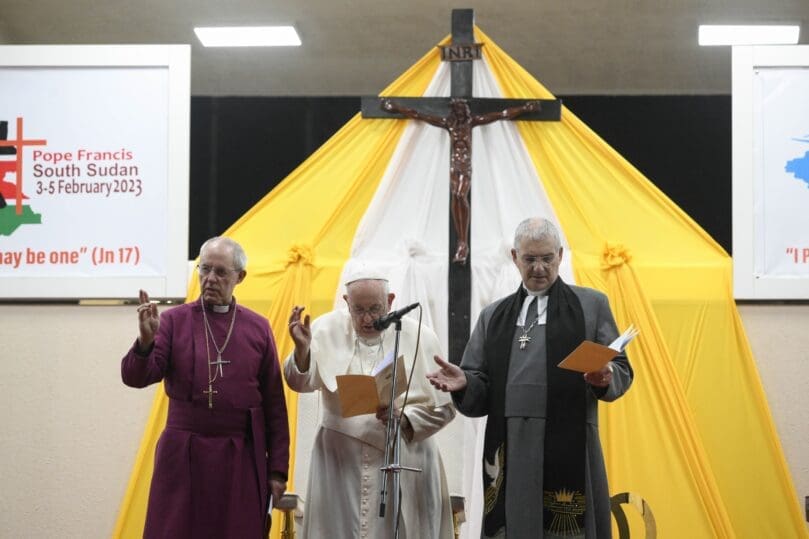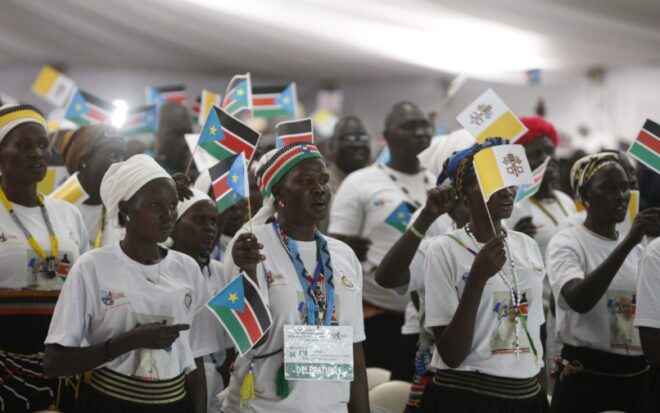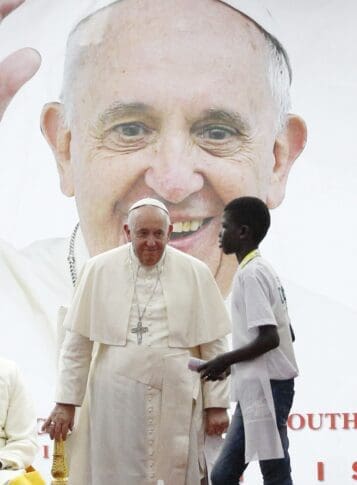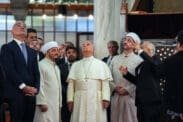 CNS photo/Vatican Media
CNS photo/Vatican MediaSouth Sudan
Pope, ecumenical leaders urge displaced South Sudanese to be peacemakers
By CINDY WOODEN, Catholic News Service | Published February 4, 2023
JUBA, South Sudan (CNS)–In a twist of fate despite a horrible situation, the millions of displaced South Sudanese people can contribute to rewriting their nation’s history by working together and living peacefully side by side in the displaced people’s camps that dot the country, Pope Francis said.
“You are the seed of a new South Sudan, a seed for the fertile and lush growth of this country,” the pope told about 1,500 people who had been forced from their homes because of violence or natural disasters.
The new South Sudan will be built by “you, from all your different ethnic groups, you who have suffered and are still suffering, you who do not want to respond to evil with more evil,” the pope told them during a meeting Feb. 4 at Juba’s Freedom Hall.
Nyakuor Rebecca, who lives in a camp in Juba, asked Pope Francis to bless all the children of South Sudan, especially those who are born in and grow up in the camps.

People wave flags as Pope Francis arrives for a meeting with internally displaced people at Freedom Hall in Juba, South Sudan, Feb. 4. CNS photo/Paul Haring
The pope said yes, of course, and told her, “that blessing will be very special, since I will be giving it together with my brothers Justin and Iain”–Anglican Archbishop Justin Welby of Canterbury and the Rev. Iain Greenshields, moderator of the Presbyterian Church of Scotland, who were making the ecumenical pilgrimage of peace with the pope to South Sudan.
Rev. Greenshields opened the meeting, praying that God’s wisdom, grace and peace would “flow into the heart and minds of all who are in transition in this place. Help us all, by your grace to find our way home. To be at peace with one another.”
Archbishop Welby prayed that the Holy Spirit would bring “life to the places of darkness, love to hearts of hate, hope to a world of fear and despair. Rest in our hearts today, transform our lives so we might transform our world. May your fire burn away all hatred and bitterness, fear and enmity and set us alight with your love, your justice and your peace.”
Organizers of the meeting had chosen Rebecca and two other young people to offer testimonies to the church leaders.
Joseph Lat Gatmai, 16, has spent more than half his life in the Bentiu camp. “I am appealing to our leaders in this great nation of South Sudan to bring lasting peace, love, unity and prosperity to our country,” adding that he wants to go home.

Pope Francis meets an internally displaced young man after he spoke during a meeting with internally displaced people at Freedom Hall in Juba, South Sudan, Feb. 4. CNS photo/Paul Haring
Johnson Juma Alex, 14, lives in the sprawling Malakal camp; it is over capacity, “small and crowded,” he said. “There is not enough space to play football. Many children do not go to school because there are not enough teachers and schools for all of us.”
“The future cannot lie in refugee camps,” the pope said. “As you said, Johnson, there is a need for all children like yourself to have the opportunity to go to school–and to have a field to play football (soccer)!”
“There is a need for you to grow as an open society, for different groups to mingle and to form a single people by embracing the challenges of integration, even learning the languages spoken throughout the country and not just those in your particular ethnic group,” Pope Francis continued.
But, he said, to meet all the country’s challenges, “there is a need for peace.”
Sara Beysolow Nyanti, the U.N. secretary-general’s deputy special representative to South Sudan, gave the religious leaders an overview of the situation: about 2 million people displaced within South Sudan and another 2 million who have sought refuge outside the country.
“Extreme levels of food insecurity and malnutrition affect two-thirds of the country’s population,” she said, which makes South Sudan “one of the worst food emergencies globally. An estimated 8 million people are expected to experience food insecurity in 2023.”
Traveling around the country and visiting the camps, she said, has convinced her that “if the women of South Sudan are given an opportunity to develop, to have space to be productive, South Sudan will be transformed. Women are the key to transformation, and they can lead their communities toward a better future.”
Unfortunately for now, she said, “women and girls are extremely vulnerable to sexual and gender-based violence, and they risk being violated while carrying out their daily routines. Children risk being abducted, recruited by local armed groups or trafficked.”
Pope Francis said he agreed with the U.N. representative: “Mothers, women are the key to transforming the country. If they receive the proper opportunities, through their industriousness and their natural gift of protecting life, they will have the ability to change the face of South Sudan, to give it a peaceful and cohesive development.”
“I ask you, I ask all the people of these lands, to ensure that women are protected, respected, valued and honored,” he said. “Please, protect, respect, appreciate and honor every woman, every girl, young woman, mother and grandmother. Otherwise, there will be no future.”
Joseph Majier, 25, who was near the back of the hall, said he is the volunteer secretary of the Mahad camp, which has 2,225 “households” and 7,826 residents. He, his sister and two brothers have lived there since 2013 when they fled Jonglei State.
“My mother and father were lost in the fighting,” he said. Asked to clarify, he said, “They died.”
He and his siblings live on donated food and the little he is able to earn. “When supplies come, I can deliver them or when ladies make tea, I sell it.”
Joseph Matik Chuol is one of the hundreds of thousands of South Sudanese who have been displaced repeatedly. In fact, he said, when his family took refuge in Khartoum, Sudan, in 1993, he was in a church choir and sang for Pope John Paul II.
He has lived alone in the Juba camp since “Dec. 16, 2013,” he said; “some of my family ran back to Khartoum, others to Kenya.”

